You've probably experienced the disappointment of biting into a homemade pickle only to find it's lost its crunch. That's where traditional pickling lime comes in – it's your secret weapon for maintaining that satisfying snap in your preserved vegetables. Whether you're a seasoned pickler or just starting out, choosing the right lime product can make all the difference. Let's explore seven proven options that'll help you achieve pickle perfection in your kitchen.
Mrs. Wages Pickling Lime (1 lb Resealable Bag)
Home canners and pickle enthusiasts who prioritize crisp, traditional results will find Mrs. Wages Pickling Lime an excellent choice for their preserving needs. This 1 lb resealable bag contains pure, food-grade calcium hydroxide with no additives or artificial ingredients.
You'll appreciate that it's kosher certified and made in the USA. While you'll find it ideal for cucumbers, green tomatoes, and watermelon rinds, you can also use it for water glassing eggs. Though some users note the packaging could be improved, and it's pricier than hardware store lime, the quality and included recipe make it worth your investment.
Best For: Home canners and pickling enthusiasts who want high-quality, food-grade pickling lime for creating crisp, traditional pickled vegetables and preserving eggs.
Pros:
- Pure food-grade calcium hydroxide with no additives or artificial ingredients
- Versatile uses including pickling vegetables and water glassing eggs
- Includes recipe and produces consistently crisp results
Cons:
- More expensive than similar products from hardware stores
- Packaging design could be improved to prevent spillage
- Can be difficult to find in local stores
Pickling Lime (16 oz, ZIN: 524953)
Traditional food preservers seeking reliable pickling supplies will find the Pickling Lime (16 oz, ZIN: 524953) an essential addition to their pantry. You'll appreciate this food-grade calcium hydroxide for its versatility in pickling cucumbers, making tortillas, and water glassing eggs.
You can trust Larissa Veronica's commitment to quality, as their products undergo strict laboratory testing. The tamper-proof, recyclable packaging keeps the lime fresh when stored at 65-75°F. Mix it with pure water to create lime water, or use ½ cup per gallon for preserving eggs up to two years. It's kosher for Passover, vegan, and made in the USA.
Best For: Home canners, traditional food preservers, and homesteaders looking for a reliable, food-grade calcium hydroxide for pickling vegetables, making tortillas, or water glassing eggs.
Pros:
- High-quality, laboratory-tested product with proven effectiveness for multiple food preservation applications
- Long shelf life when properly stored and comes in tamper-proof, recyclable packaging
- Versatile uses including pickling, egg preservation (up to 2 years), and tortilla making
Cons:
- Requires careful measurement and mixing to achieve proper concentrations
- Cannot be used with chlorinated tap water for water glassing eggs
- May be challenging to find proper storage conditions within the specific temperature range (65-75°F)
Mrs. Wages Xtra Crunch Pickle Mix (5.5 oz)
Serious canners seeking consistently crisp pickles will appreciate Mrs. Wages Xtra Crunch Pickle Mix. This 5.5 oz jar uses pickling lime to maintain vegetable crispness and works efficiently with just 1/8 teaspoon per pint. You'll find it's kosher-certified and can make up to 130 quarts.
While it's pricier at $24.96, users report their pickles staying crisp for up to five years. It's versatile enough for jalapeños, okra, and other vegetables. You'll need to follow the jar's directions carefully, as this mix won't revive already limp produce. Some canners note it's less effective than traditional lime methods, but it's designed specifically for Mrs. Wages Quick Process recipes.
Best For: Home canners who prioritize maintaining vegetable crispness in their pickled products and are willing to invest in a specialized pickling mix for long-term storage.
Pros:
- Small amount goes a long way (1/8 teaspoon per pint, makes up to 130 quarts)
- Effectively maintains crispness of vegetables for several years
- Versatile use across different vegetables including peppers and okra
Cons:
- Relatively expensive price point for the quantity ($24.96)
- Not as effective as traditional lime pickling methods
- Cannot restore already limp vegetables to crisp state
Mrs. Wages Pickling Lime
Experienced canners and homesteaders will appreciate Mrs. Wages Pickling Lime for its versatility and effectiveness. This 16 oz. bag contains pure food-grade calcium hydroxide, making it perfect for creating crisp cucumber pickles, green tomato pickles, and watermelon rind preserves.
You'll find this product especially valuable if you're into egg preservation through water glassing. Just mix 1 oz per quart of water to keep your eggs fresh for up to two years. You can also use it for nixtamalization and making crunchy jams. While some users note issues with the bag's seal design, the product's quality and reasonable pricing make it a reliable choice for your food preservation needs.
Best For: Home canners, homesteaders, and chicken owners looking for a versatile food-grade lime product for pickling vegetables and preserving eggs long-term.
Pros:
- Pure food-grade calcium hydroxide with no additives or preservatives
- Versatile uses including pickling, egg preservation, and nixtamalization
- Cost-effective with one bag making up to 9 quarts of pickling solution
Cons:
- Poor bag design with seal placement below reusable zip
- Some shipping issues with incorrect quantity fulfillment
- Limited size options available (only 16 oz bags)
Pickling Lime, 16-oz.
Home picklers seeking authentic, crisp results will find Mrs. Wages Pickling Lime Mix a reliable choice for traditional preserving. You'll get three 16-oz bags of pure calcium hydroxide with no additives or preservatives.
You can use this versatile pickling lime to create crisp cucumber pickles, green tomato preserves, and watermelon rind pickles. It's also effective for water glassing eggs. The eco-friendly packaging arrives in plain cardboard without excess plastic or styrofoam.
You're getting great value with the three-pack bundle, and you'll appreciate how well it maintains the crunchiness of your pickled vegetables. For best results, follow standard pickling safety guidelines.
Best For: Home canners and picklers who want to make extra-crispy traditional pickles and preserve eggs using time-tested methods.
Pros:
- Pure food-grade calcium hydroxide with no additives or preservatives
- Versatile product that works for multiple preserving applications including pickles and egg storage
- Eco-friendly packaging with minimal plastic waste
Cons:
- May require careful measurement and handling as it's a concentrated product
- No included packing slip for order verification
- Limited instructions on package for various preservation methods
Ball 72750 2.75 Oz Pickle Crisp
Pickling enthusiasts seeking a convenient alternative to traditional lime will find Ball 72750 2.75 Oz Pickle Crisp to be a practical solution for maintaining vegetable crunchiness. This product works well in water bath canning, though you'll see mixed results with pressure canning.
For best results, you'll need to start with firm cucumbers, particularly Persian varieties from ethnic food stores. Inspect each cucumber carefully, rejecting any with soft bloom ends. You can pack about 30 cucumbers upright in a fermentation crock for a two-week pickling process.
While effective, you should note that packaging issues have been reported, with some customers receiving damaged containers in flimsy envelopes.
Best For: Home canners and pickling enthusiasts who want to maintain crunchiness in their preserved vegetables without using traditional lime methods.
Pros:
- Effective alternative to lime for maintaining vegetable crispness in water bath canning
- Compatible with standard fermentation processes using traditional crocks
- Easy to use with straightforward application process
Cons:
- Packaging and shipping issues with reports of damaged containers and slow delivery
- Inconsistent results when used in pressure canning
- Smaller container size than expected for the price
Hoosier Hill Farm Pickle Fresh Granules, 1.5LB (Pack of 1)
Canners seeking a convenient alternative to traditional lime soaking will find Hoosier Hill Farm Pickle Fresh Granules a game-changing solution. This calcium chloride-based product keeps your pickled vegetables crispy and fresh without the lengthy lime-soaking process.
You'll appreciate the straightforward application – just add 1/4 teaspoon per quart jar or 1/8 teaspoon per pint jar after placing your vegetables. One 1.5-pound container handles over 160 quarts of pickles, making it highly economical. It's versatile enough for cucumbers, peppers, carrots, green beans, and garlic. While you might need to adjust your recipes slightly for sweetness, you'll save significant prep time while achieving professional-quality crunchiness in your home-canned produce.
Best For: Home canners and pickle-makers who want professional-quality crispy results while saving time on traditional lime-soaking methods.
Pros:
- Large quantity (1.5 LB) provides excellent value, making up to 160 quarts of pickles
- Significantly reduces preparation time compared to traditional lime-soaking methods
- Versatile application for various vegetables including cucumbers, peppers, carrots, and green beans
Cons:
- May require recipe adjustments due to its effect on sweetness levels
- Small print on usage instructions can be difficult to read
- Processed in a facility with allergens (dairy, soy, peanuts, wheat) which could be a concern for some users
Factors to Consider When Choosing Traditional Pickling Lime for Crisp Vegetables
When selecting traditional pickling lime, you'll want to verify the product meets food-grade quality standards and comes in moisture-resistant packaging that preserves freshness. Consider how much pickling lime you'll need per recipe batch and choose a quantity that matches your preserving plans while evaluating the price per pound to guarantee good value. The brand's reputation and history in pickling supplies can indicate product reliability, as established manufacturers often maintain consistent quality standards.
Food-Grade Quality Standards
The selection of food-grade pickling lime demands careful attention to quality standards that guarantee both safety and effectiveness in your preserving projects. When you're choosing pickling lime, look for products that carry certifications confirming they're free from harmful contaminants and artificial additives. You'll want to verify the calcium hydroxide meets strict purity requirements through independent laboratory testing.
Check that your pickling lime comes in resealable packaging to maintain freshness throughout your preserving season. Since the quality of your lime directly affects the crispness of your pickled vegetables, don't compromise on certification standards. Select products that are kosher-certified and contain no artificial colors, flavors, or preservatives. These quality markers aren't just formalities – they're essential for achieving the perfect crunch in your pickled produce.
Packaging and Storage Features
Smart packaging features play an essential role in maintaining your pickling lime's effectiveness and safety. Look for products that come in resealable bags or containers, which help preserve freshness and make storage more convenient after you've opened them.
You'll want packaging that prevents spills and allows easy access during use. Check that the container has tamper-proof seals and food-grade certifications to ascertain product safety and purity. Clear usage instructions printed on the package can guide you through the pickling process more effectively.
Store your pickling lime in its original container in a dry area where temperatures remain steady between 65-75°F. When choosing your product, prioritize designs that offer practical dispensing methods and secure closure systems to protect the lime from moisture and maintain its quality over time.
Quantity Per Recipe Needs
Beyond proper storage, determining the right quantity of pickling lime for your recipes makes a significant difference in your preservation results. You'll need to carefully match your purchase amount to your specific recipe requirements. For water glassing eggs, plan on using 1 ounce of pickling lime per quart of water, while cucumber pickling typically requires 1 tablespoon per gallon of brine.
Check the product's yield information on the package to verify you're getting enough for your planned preserving projects. If you're preparing multiple batches, you might want to opt for bulk packaging or multiple units. This is especially important during peak canning season when you don't want to run short of supplies mid-project. Always measure precisely to achieve the best crunch and flavor in your preserved foods.
Brand Reputation History
When selecting pickling lime, brand reputation serves as a crucial indicator of product quality and reliability. You'll want to look for manufacturers with a proven track record of maintaining strict food safety standards and producing pure, additive-free products.
Check for brands that have earned consistent positive customer feedback and demonstrate high retention rates among repeat buyers. The most trustworthy companies typically invest in thorough quality control processes and provide detailed usage instructions to help you achieve ideal results. You'll find that well-established brands have often built their reputations through years of delivering effective pickling products that consistently enhance vegetable preservation.
Before making your choice, research the brand's history of customer support and their commitment to maintaining product purity, as these factors directly impact your pickling success.
Price Per Volume Value
Understanding price per volume helps you make informed decisions about your pickling lime investment, just as brand reputation guides quality expectations. You'll find that 16 oz bags typically cost between $3 and $10, with prices varying by brand and packaging type.
When you're considering your options, remember that bulk purchases often offer the best value per ounce, making them ideal if you're a frequent canner. However, if you only pickle occasionally, smaller packages might better suit your needs, even though they cost more per ounce. To determine the best value, calculate how many jars or quarts you can process with each package size. This approach helps you balance your immediate needs with long-term cost efficiency, ensuring you don't overspend or waste product.
Preservation Method Compatibility
The versatility of traditional pickling lime makes it an invaluable tool across multiple preservation methods. You'll find it's particularly effective for both vegetable pickling and water glassing eggs, giving you multiple preservation options with a single product.
When you're pickling vegetables, you can create a lime solution that'll enhance the crispness of cucumbers and green tomatoes. This traditional method helps you achieve that satisfying crunch you're looking for in your preserved vegetables. For egg preservation, you'll discover that pickling lime's water glassing capabilities can keep your eggs fresh for up to two years.
To get the best results, you'll want to use fresh, firm vegetables and follow proper mixing instructions for creating your lime solution. This guarantees you'll maximize the effectiveness of your preservation efforts.
Frequently Asked Questions
How Long Does Homemade Pickled Vegetables Last When Using Pickling Lime?
Your homemade pickled vegetables can last up to 12 months when you've properly used pickling lime and stored them in a cool, dark place. They'll stay crisp and safe to eat when sealed correctly.
Can I Reuse Pickling Lime Solution for Multiple Batches?
You shouldn't reuse pickling lime solution. Each batch needs a fresh mixture to guarantee proper calcium absorption and food safety. The solution loses its effectiveness after first use and could harbor harmful bacteria.
Is Pickling Lime the Same as Hydrated Lime?
No, they're not exactly the same. While both are calcium hydroxide, pickling lime is food-grade and specially processed for culinary use. You shouldn't substitute hydrated lime (used for construction) in your pickling recipes.
What Safety Precautions Should I Take When Handling Pickling Lime?
You'll need rubber gloves, eye protection, and a dust mask when handling pickling lime. Don't let it contact your skin, avoid breathing dust, and keep it away from children. Always wash hands thoroughly after use.
Can Pickling Lime Be Used for Other Food Preservation Methods Besides Vegetables?
You can use pickling lime for preserving fruits like apples and pears, but it's primarily used for vegetables. Don't use it for fermentation processes. Stick to vegetables for the safest and most reliable results.
In Summary
You'll find that selecting the right pickling lime makes all the difference in achieving those perfectly crisp vegetables. Whether you choose Mrs. Wages for its reliability, Ball Pickle Crisp for convenience, or Hoosier Hill Farm for bulk pickling, your success depends on following proper measurements and safety guidelines. Don't forget to thoroughly rinse your vegetables after using pickling lime to guarantee safe, crunchy results every time.
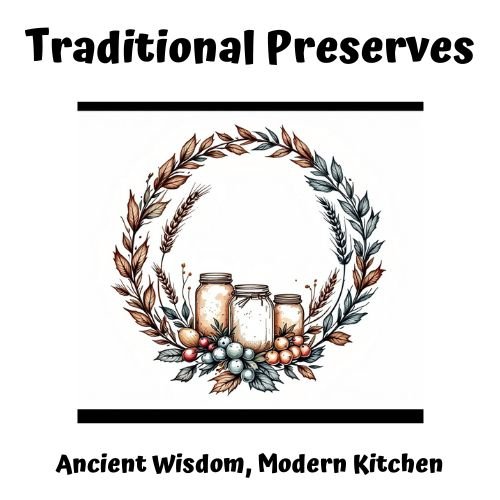
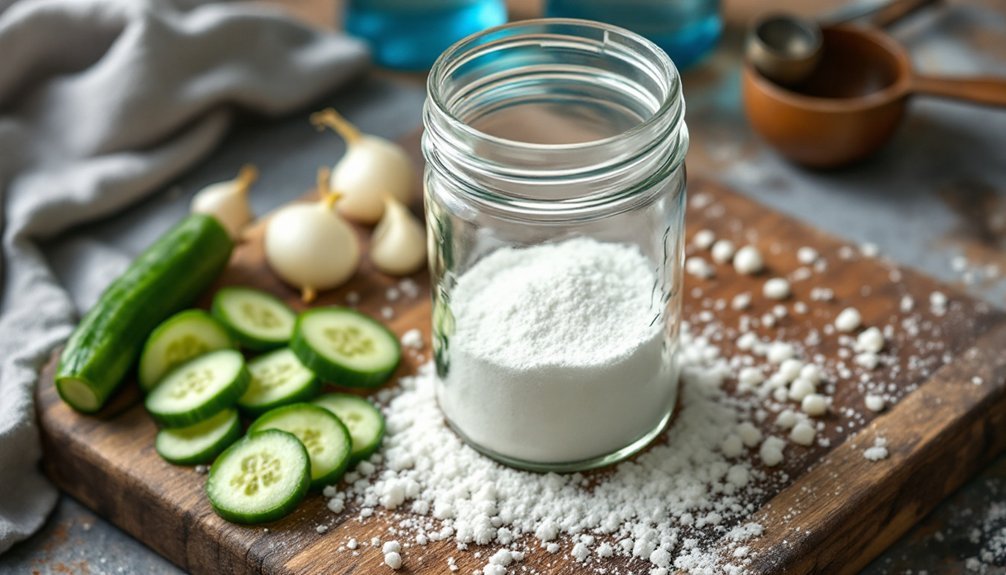
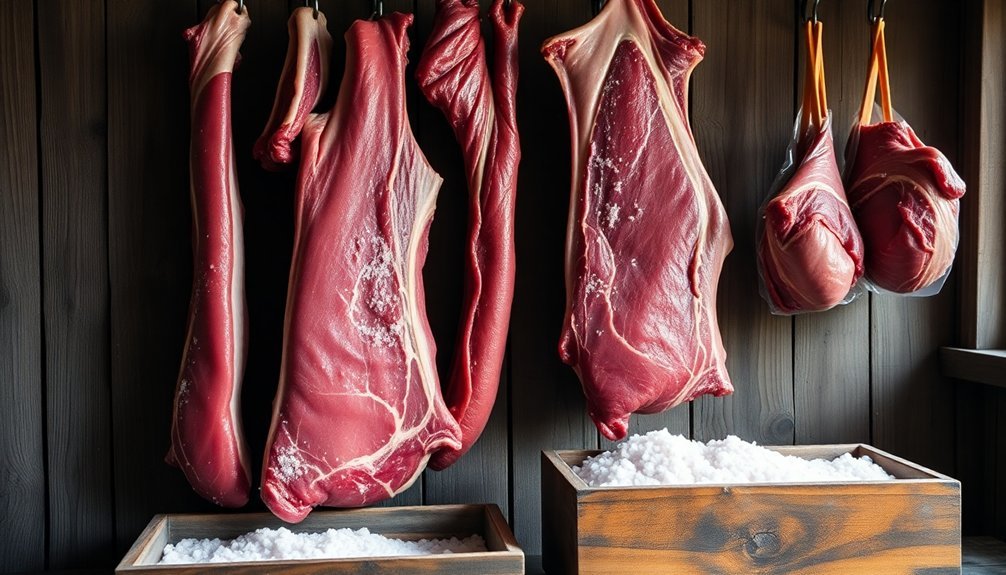
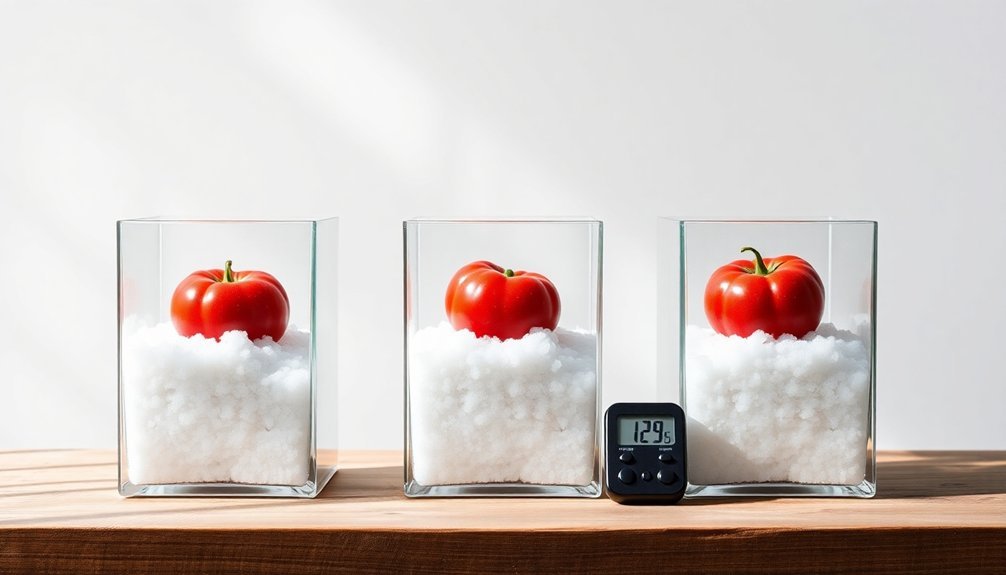
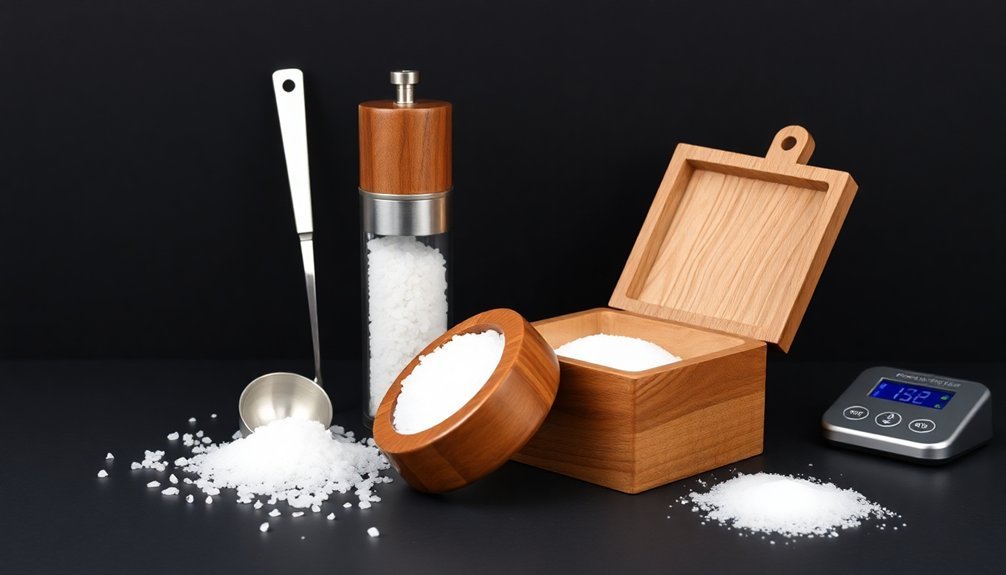
Leave a Reply